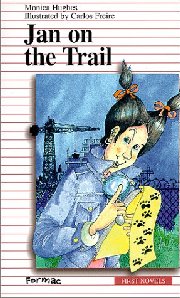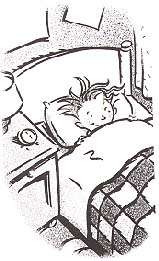|
________________
CM . . . .
Volume VII Number 9 . . . . January 5, 2001
Halifax, NS: Formac, 2000.
Formac Publishing continues its production of early chapter books with five additional titles by
well-known authors and illustrators in this new "First Novel" series. The series presents a variety
of plots in short chapters appropriate for the intended grade 2-4 audience. The large type,
sprinkled with appealing illustrations, and the attractive cover design will invite independent
readers who may be familiar with each of the characters from previous titles. With the exception
of Robyn Looks for Bears, which takes place in the western mountains, the novels are set in
generic urban locations.
The values of friendship, loyalty and honesty are common themes in these books. Morgan's
Secret shines for its humourous characterization, and Robyn Looks for Bears for its suspense.
Jan on the Trail and Duff's Monkey Business offer simple mysteries, and Lilly Plays her
Part reinforces the value of cooperation and the acceptance of individual differences.
Robyn Looks for Bears
In Robyn Looks for Bears, Robyn bravely states to her friends and to herself, "This summer,
I'm going to see a bear." But a couple of promising leads on bear sightings at her aunt and uncle's
mountain cabins bring humourous, and disappointing, results. Robyn only sees bears in her
dreams. Then, a scary encounter with a porcupine makes her realize how dangerous meeting a
bear might be. She decides it's smarter to be safe, and she gives up looking for them. Of course,
that's when the things you want most are apt to happen.
The plot is well paced from Robyn's clearly established goal on the first page (to "end up with a
great story you can tell everyone for years and years") through the suspenseful 'false alarms' to the
satisfying ending. Character development proceeds in easy stages with Robyn always front and
centre. Author Hazel Hutchins guides readers unerringly to Robyn's secret: she's scared of bears.
She's also wary of heights, but, when she manages to overcome that one, she's well rewarded with
her heart's desire. Kids will identify with Robyn's goal and empathize with her frustrations and
eventually her honesty. And they'll be just as captivated by the magic of the final scene as is Robyn
herself.
Highly Recommended.
Morgan's Secret
In Morgan's Secret, it could be the end of a great friendship if
Morgan's pal Charlie finds out he's blabbed a secret: Charlie likes Erin.
Morgan couldn't help it. He feels intimidated by Aldeen Hummel, the
Godzilla of Grade Three, and it just slipped out. Friendless Aldeen uses
the secret to blackmail Morgan into playing with her and no one else,
until Charlie learns the truth. With nothing more to lose, Morgan tells
Aldeen off and impresses upon her the way real friends should behave.
Aldeen surprises everyone by showing that she understands the key word:
forgiveness.
The plot is a tangle of secrets and unintentional lies, misunderstandings
and missed opportunities to straighten everything out. It is the contrast
in characterization between wimpy Morgan and Aldeen the bully that keeps
readers chuckling through this book. Ted Staunton's portrayal of the
Godzilla of Grade Three, in her purple sweatsuit, is great: "...witchy
hair bouncing, bandaids flapping, shoelaces flopping in the dust." Readers
can't help feeling sorry for poor Morgan who regrets his loose tongue from
the instant the secret escapes. The dialogue is snappy and generous.
Bill Slavin's accompanying sketches are full of motion and emotion.
Highly Recommended.
Lilly Plays Her Part
The casting for the school play, Hansel and Gretel, creates problems in Brenda Bellingham's
Lilly Plays Her Part. Lilly, the best singer, is pleased with her role as Gretel until Kendall,
as Hansel, complains she is taller than he. Lilly's best friend, Minna, dislikes being cast as the
witch because she doesn't cackle well enough. Arguments abound as the kids debate whether the
stepmother should be wicked and the trail Hansel leaves should be breadcrumbs. The
disagreement between Lilly/Gretel and Kendall/Hansel threatens to ruin the play until the kids
work out a compromise. Lilly must give up her prized role "for the good of the team."
Spirited debate among the characters drives the story in this
child-centred novel. The teacher guides them but does not impose
decisions. The dialogue is true-to-life:
excerpt:
Recommended.
Duff's Monkey Business
While the plot is fairly simple, the theme is significant. The boys stand up to all the challenges to
their honesty: "Duff's sister would roll her eyes and say, 'Oh sure.' The teacher would plead, 'Oh
come now Duff!'...Their friends kept saying 'Yeah, yeah. Tell us another one," eventually proving
that even adults can be wrong. The action suffers from a slow-down through the middle with a
few too many indicators of the passage of time. However, it is satisfying to note that Duff and
Simon decide the price of honesty isn't too high. They plan to continue to "spend the time before
supper looking for stray spacemen who've fallen out of their saucers!"
Recommended.
Jan on the Trail
In Monica Hughes' Jan on the Trail, Jan and Sarah are broke and bored. A poster offering a
reward for finding a lost dog attracts their attention, mainly because they know the dog from a
local pet shop. As would-be detectives, they trail a suspected dog-napper, but that only gets them
lost as well. A restaurant owner gives them a good lead, and the dog is discovered, trapped at a
construction site. The girls earn a reward for their detective work.
The plot is uncomplicated in this one, but, as a mystery, it lacks suspense. The main characters do
not undergo any change; their concern and kindness for others are evident from beginning to end.
The small boy and his mother who now own the dog are the ones who have a change of heart
over the dog's name after the search succeeds. This novel would likely have most appeal for
the younger range of intended readers with an interest in pets. Adults might have concerns about
the girls' decision to follow a suspicious man "wearing a T-shirt that says NO FEAR...[whose]
hair is long and scraggly," especially since they checked out as "responsible" before the small boy
was allowed to accompany them.
Recommended.
A former teacher-librarian, Gillian Richardson, who lives in BC, is a published writer of children's
fiction and nonfiction.
To comment on this title or this review, send mail to cm@umanitoba.ca.
Copyright © the Manitoba Library Association.
Reproduction for personal use is permitted only if this copyright notice
is maintained. Any other reproduction is prohibited without
permission.
Published by
TABLE OF CONTENTS FOR THIS ISSUE - January 5, 2001.
SEARCH |
AUTHORS |
TITLES |
MULTIMEDIA |
PROFILES |
BACK ISSUES |
CMARCHIVE |
HOME
| |||||||||||


 Because Duff, in Budge Wilson's Duff's Monkey Business, is known for his overactive
imagination, his report of a monkey in the barn isn't taken seriously, not even by his friend Simon
at first. Problem is, the monkey only appears for the boys. Classmates and adults grow weary of
their insistence; Duff's parents become concerned about lies. The mystery is solved when the
circus that arrives in town claims to have lost its star performing monkey. The boys are rewarded
with free passes and apologies all around.
Because Duff, in Budge Wilson's Duff's Monkey Business, is known for his overactive
imagination, his report of a monkey in the barn isn't taken seriously, not even by his friend Simon
at first. Problem is, the monkey only appears for the boys. Classmates and adults grow weary of
their insistence; Duff's parents become concerned about lies. The mystery is solved when the
circus that arrives in town claims to have lost its star performing monkey. The boys are rewarded
with free passes and apologies all around.